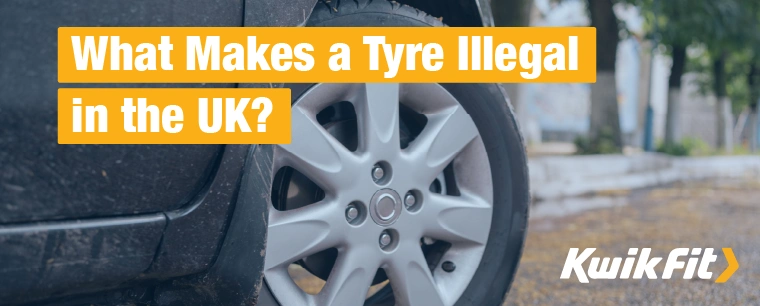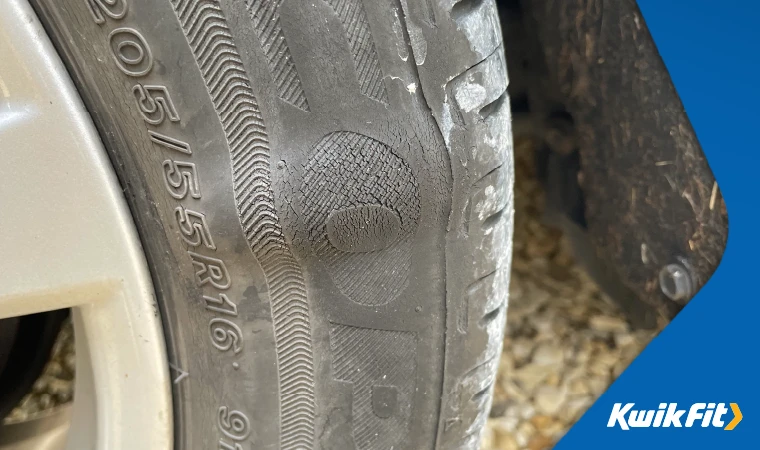What Makes a Tyre Illegal in the UK?
Jack Dreyer | Friday 12th January 2024 10:00am

Most experts would agree that, along with your car’s brakes, your tyres are absolutely the most important component of your car. And while they may feel perfectly fine while driving on a sunny day – you may be driving illegal tyres without ever realising! But it’s crucial you know what can make your tyres illegal so you’re never caught on the wrong side of the law.
It’s also worth remembering here that the laws on tyre types & conditions aren’t there to purposely catch you out, but in order to keep you and other road users safe.
So what can make a tyre fall short of the legal requirements?
1. Low Tread Depth
One of the most regular problems that people face with their tyres is letting the tread depth get too low. The legal minimum tread depth is 1.6mm across the central three-quarters of the tyre’s face and around the entire circumference.
You can read in detail about tyre tread patterns and tyre types here but, in short, the tread pattern of a tyre is developed to channel water and small debris away from your tyres in order to let you maintain a firm grip on the road. The grooves create space for water to fill so that the face of the tyre can remain in contact with the ground.
Think of them like hiking boots – the thickness and depth of the sole helps you stay stable on muddy ground. Now, when the tyres have worn too low, they won’t be able to channel the water and therefore won’t be able to maintain contact with the road.
Even though the legal minimum is 1.6mm, it’s worth changing your tyres when they’re around a depth of 3mm. This is because, typically, puddles on a road are likely to be a lot deeper than 1.6mm!
2. Excessive tyre wear or sidewall damage
As important as keeping an eye on the tyre tread depth is for driving in wet weather, it’s also important for the sake of the stability of the tyre. Excessive wear can lead to weak spots in the tyre which, in turn, can lead to tyre blowouts.
When you’re driving at higher speeds, these can be fatal.
And it’s not just a case of hitting a big bump, because when you have excessively worn tyres, small, slightly sharp stones can also burst your tyres.
As such, it’s worth keeping in mind what condition your tyres are in. Inspect them regularly for any signs of cracking, bulging, or any damage to the sidewall. Damage to the sidewall means that a tyre is more likely to split; additionally, any bulging indicates a serious issue, as it could be a sign of damage to the tyre structure. So have your tyres checked immediately if you see any bulging.

3. Mixing tyre ply
Tyres are made out of different rubber compounds for elasticity and strength, but on its own, most rubber can’t withstand the forces of internal pressure as well as those needed to hold a car up.
To stand up to these forces, and to give tyres specific characteristics, manufacturers mould the rubber around a layered lattice of cord. This cord grid acts as a flexible skeleton to hold the rubber together.
The different ways this chord grid is overlaid is what we call the tyre’s ‘ply’. There’s the base layer and the ‘crown’ layer above it. The way these are orientated is either known as “Radial Ply” or “Bias Ply”. This video from Michelin explains perfectly what the pros and cons of each ply are.
Importantly, primarily because they have different inherent characteristics, mixing different-ply tyres on your vehicle is against the law in the UK because they’ll handle the load differently than they should.
4. Under or over inflated tyres
Under-inflated tyres are the most common problem that drivers face – but you can actually receive a serious fine and points on your licence for driving with under-inflated tyres. The same is true for over-inflated tyres, but for the opposite reasons.
With under-inflated tyres, they grip the road much more than they’re intended to (because the sides of the tyre sag down with the pressure) and are less responsive to directional changes. This, in turn, reduces your handling when going around bends or driving at higher speeds.
Overinflated tyres, on the other hand, could lead to blowouts and skidding. The more pressurised a tyre is, the less it’s able to grip a road (because it’s held up on a more specific point – like a balloon), so the more likely it is that your tyres will spin or skid when braking.
5. Improper tyres for the vehicle’s use
This last point is the least common, but driving with tyres that are unfit for a vehicle’s purpose can actually be illegal. This usually applies to having tyres that don’t meet the load requirements of the vehicle or have a max speed rating that is unsuitable.
For example, fitting car tyres to a motorhome (which you’d really have to try hard to do) is a bad idea. Not only because they tend to be a smaller diameter, but because they can’t handle the weight of a motorhome. On the other hand, wheels that are too large for a vehicle will significantly affect handling, and are likely to be dangerous without serious vehicle modifications – which themselves could render your vehicle illegal.
Worried about your tyres?
If you notice any excessive wear on your tyres, get them checked by an expert immediately by calling your local Kwik Fit centre.
Any facts, figures and prices shown in our blog articles are correct at time of publication.
Featured Articles
Is it Illegal to Drive With One Headlight?
Saturday 19th July 2025
Wondering if it’s illegal to drive with one headlight? Learn about the safety risks and penalties of illegal blown bulbs and why you should fix them promptly.
Air Con in EVs & Hybrids: Experts Answer Your Questions
Monday 30th June 2025
Does air con drain EV batteries? Can you use the air con while charging an electric car? Find out the answers to these questions & more from Kwik Fit’s experts.
Why Is Your Car Making a Noise? Fixes & Tips
Friday 13th June 2025
When your car starts making unexpected noises, it can certainly be quite disconcerting; it may be nothing to worry about, but here’s what you need to know.









